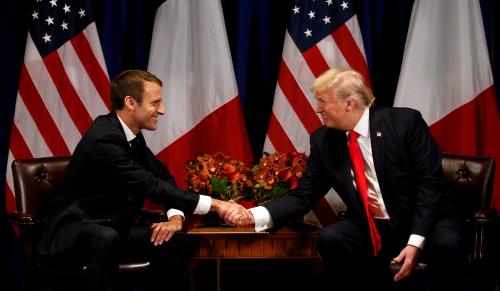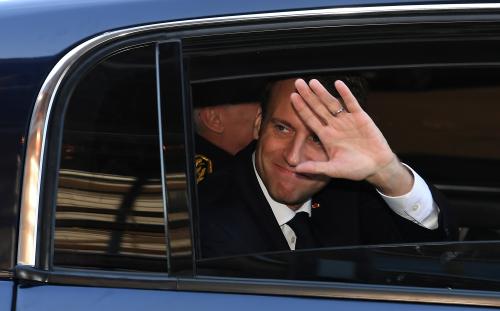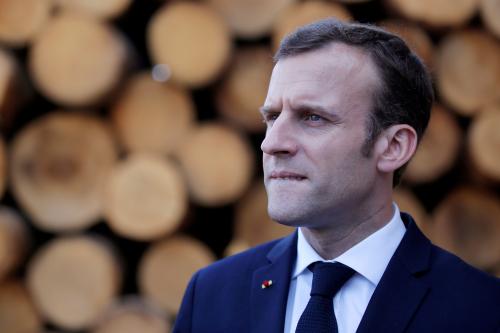This week, the leaders of France and Germany make back-to-back visits to Washington. On Tuesday, U.S. President Donald Trump will honor his French counterpart, Emmanuel Macron, with his first state dinner; three days later, he will meet with German Chancellor Angela Merkel. High up on both leaders’ agendas will be trade, with the European exemption from U.S. steel and aluminum tariffs set to expire on May 1, and the Iran nuclear deal, which Trump has insisted European leaders “fix” by May 12.
But beyond specific policy disagreements, Trump has presented a fundamental challenge for continental Europe’s two most important powers—a challenge to which France and Germany have responded very differently. The two approaches, which can essentially be boiled down to French pragmatism versus German petulance, are entirely characteristic of their respective political cultures. One of the two approaches—likewise characteristically—has proved far less effective.
From the moment Trump’s shocking election victory was announced in November 2016, the response of German officialdom, media, and the public has been a mix of moralism and hysteria. “Germany and America are connected by values of democracy, freedom and respect for the law and the dignity of man, independent of origin, skin color, religion, gender, sexual orientation or political views,” Merkel said in a statement the day after the election, adding, “I offer the next President of the United States close cooperation on the basis of these values.” Merkel was, in essence, presenting a qualified and conditional olive branch to the incoming American president, whose erratic behavior and incendiary rhetoric on the campaign trail indeed raised troubling questions about his commitment to the shared values of the trans-Atlantic alliance.
At a campaign rally the following year, Merkel delivered an even blunter message. “The era in which we could fully rely on others is over to some extent,” she told a Munich beer hall after attending a G7 summit where both Trump and Brexit loomed large. “We Europeans truly have to take our fate into our own hands—naturally in friendship with the United States of America, in friendship with Great Britain. … But we have to know that we Europeans must fight for our own future and destiny.”
Merkel has been relatively restrained among German leaders. “Trump is the pioneer of a new authoritarian and chauvinist international movement,” her then-Vice Chancellor Sigmar Gabriel declared the day after Trump’s victory. Gabriel, a Social Democrat, would later broaden his criticism beyond the mere person of the president, affirming that “even after Trump leaves the White House, relations with the U.S. will never be the same.”
In the months after Trump’s election, a narrative began to emerge among the global chattering class that, with the United States now having gone the way of “America First,” Germany, and Merkel personally, had assumed the mantle of “leader of the free world.” Given Germany’s paltry military expenditure and aversion to using force, this was always a fantasy. As the German journalist Clemens Wergin put it, his country “talks the talk, but it hardly even tries to walk the walk” when it comes to defending the liberal world order from its antagonists.
But some in Germany, goaded on by the unpredictability and boorishness of Trump, seem to have believed their own good press. Last February, the influential weekly Der Spiegel produced a sanguinary cover image of Trump decapitating the Statue of Liberty, which the artist claimed represented “the beheading of democracy.” Giving voice to decades-old yearning for “emancipation” from American hegemony, two prominent editors at Die Zeit published an essay calling for “a new foreign policy after Atlanticism” in which they complained that “the U.S. can no longer and will no longer be the stabilizer and protector of Europe,” as “the former guarantor of freedom and democracy is itself democratically out of control.” Such feelings are backed by public opinion; a recent poll found that 79 percent of Germans consider Trump a greater threat to world peace than Russian President Vladimir Putin.
If the collective German response to Trump can been characterized by its sanctimony, France’s has been marked by maturity. Trump is hardly more popular among the French than Germans (14 percent vs. 11 percent), but such dislike for the American president has not led to drastic and categorical reassessments of the Franco-American relationship. Rather than lecturing Trump (and, by implication, America), Macron’s strategy has been to hug the president close—inviting him and his wife, Melania, to Paris for Bastille Day celebrations—and express disagreements frankly when necessary. (Macron’s offer of millions of euros in “Make Our Planet Great Again” grants for American scientists to relocate to France certainly did not go unnoticed in Washington.) With Macron, Trump seems to recognize, despite their ideological differences, a fellow political revolutionary who similarly defied all the naysayers in upending an exhausted and corrupt political order.
There are, of course, deeper and more substantive reasons for the divergent French and German attitudes toward the American president. On the issues of trade and defense spending—two bugbears for Trump—France finds itself in America’s good graces. The United States has a relatively small trade deficit with France, and Paris spends over 2 percent of its GDP on defense, the minimum amount recommended for NATO members. America’s large trade deficit with Germany, on the other hand, has been a source of constant irritation to Trump, as has its low defense spending. Moreover, Merkel’s decision to permit over a million migrants and refugees to enter Germany created the impression in Trump’s mind that she stands foursquare against him on the issue that defines his political career: the defense of national borders.
As a country that was defeated in war, rebuilt, and militarily occupied by America, Germany has a relationship with the United States that is far more complicated than that of its neighbor across the Rhine. Like a big brother, America has been simultaneously loved, feared, and hated by Germany in the more than 70 years since the end of World War II. Germany remains dependent on the United States for its security, and as in any relationship, dependency can breed resentment. Popular German attitudes toward America are like mood swings, with bitter lows (the eight years of George W. Bush) followed by soaring highs (Hope!—Das Obama Musical was a real thing). In Donald Trump, Germans feel that they have lost their illusions about America. The French, by contrast, never quite romanticized America as the Germans did; having always jealously maintained a Gaullist “independence” and room for maneuver in foreign affairs and military policy, they possessed fewer illusions to lose. While the Germans loved Barack Obama for his grace and multilateral instincts, he was a letdown to the hard-nosed French, who were obliged to call off retaliatory air strikes against Syrian President Bashar al-Assad in 2013 after the U.S. president refused to enforce his red line on chemical weapons use.
The German penchant for following rules is not just a cultural stereotype; as an export nation dependent upon the United States for its security, Germans care deeply about the rules-based liberal order, and their criticisms of Trump usually take the form of frustration and incomprehension at his flagrant disregard for its norms. But Germans can afford to be sentimental about the liberal world order because they do so little to maintain it. If Germans love to speak of rules, the French better understand that enforcing them requires the power to do so. “In the case of the France–U.S. relationship, cooperation has been promoted politically as a way to pursue common strategic interests rather than as the realization of a moral and normative bond,” write Alexandra de Hoop Scheffer and Martin Quencez of the German Marshall Fund of the United States. “As a result, French leaders have learned to be relatively comfortable working with U.S. presidents who were deeply unpopular in France.”
The pragmatic versus petulant approaches to dealing with Trump mirror the ways both countries responded to another American outrage: National Security Agency espionage conducted against their politicians and citizens. In 2015, when WikiLeaks, drawing on documents obtained from the fugitive NSA contractor Edward Snowden, revealed that the United States had spied on French presidents, the reaction in Paris was a collective shrug. The French understand that this is part of life for great powers—of which France is certainly one. The French attitude toward Trump is not unlike their nonchalance at NSA spying: If Americans decide to elect a boorish television game show host as president, they will deal with him and not feel the need to whine and cry about it—and it’s not like the French themselves aren’t used to prima donna presidents.
Germany’s response to the NSA revelations could not have been more different. The press, public, and politicians demanded that the Americans be punished, a parliamentary committee was formed to investigate NSA practices, and the Berlin CIA station chief was expelled. This was, to put it simply, a hysterical overreaction, made even more apparent when compared to the lack of public outrage over Russia’s hacking Bundestag computer servers in 2015. Whatever one feels about Trump, it is preposterous to think that he poses a greater threat to world peace than the former KGB thug whose regime perpetrated the first armed annexation of territory on the European continent since World War II, backs Assad in Syria, and allegedly used a chemical nerve agent on British soil.
The result of these various dynamics is that Macron has eclipsed Merkel as Europe’s chief interlocutor with the United States, a rather momentous development considering how the German chancellor occupied that role for the full duration of the Obama presidency. There is risk in assuming this position, however, as illustrated by the experience of Merkel’s predecessor in the job: Tony Blair. The British prime minister’s prominent part in selling George W. Bush’s Iraq War “made Blair, once [one] of the U.K.’s most popular politicians, one of its most reviled,” writes Yasmeen Serhan of The Atlantic. Thus far, it is difficult for Macron to point to any significant victories his approach has garnered, as Trump has broken with European prerogatives on climate, the Iran nuclear deal, trade, and moving the U.S. Embassy to Jerusalem.
But it’s far from clear that Merkel’s more openly confrontational stance will be more productive. If anything, it has only aggravated Trump’s volatile temper and sensitivity to slights, real or perceived. It seems safe to say that Macron, watching Trump’s treatment of Merkel after returning to Paris, will have occasion to feel a very German emotion: schadenfreude.







Commentary
French pragmatism versus German petulance
April 24, 2018